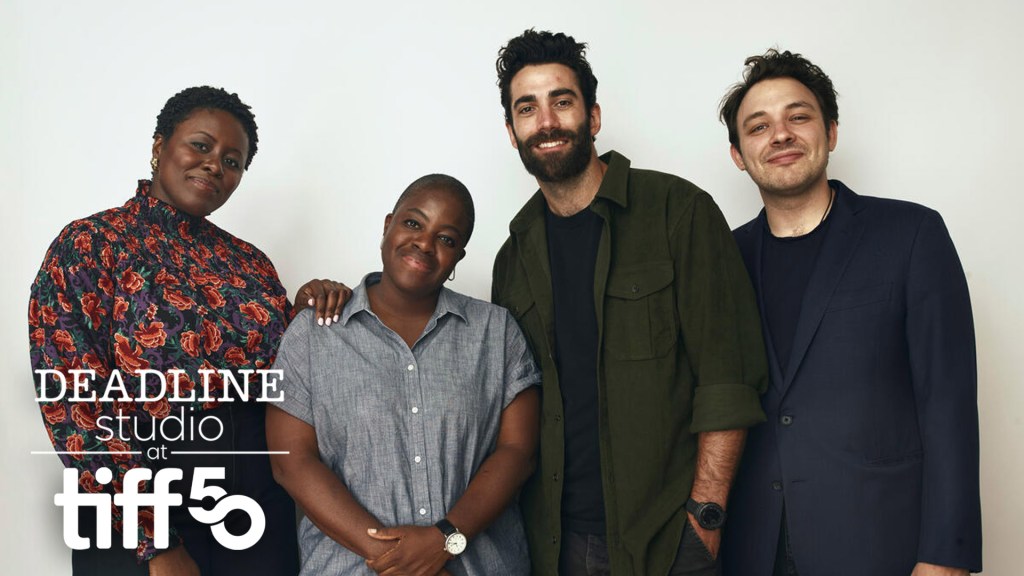Director Ben Proudfoot has won two Academy Awards for short documentaries. But he expands to feature length storytelling for his new film The Eyes of Ghana, which just made its world premiere at the Toronto International Film Festival.
The documentary centers on a remarkable 93-year-old Ghanaian filmmaker and photographer, Chris Hesse, who captured vital footage of the nascent African independence movement as the personal cinematographer to Kwame Nkrumah, the first leader of a free Ghana.
“Chris shot hundreds of films of Kwame Nkrumah. And in the ’66 coup when Nkrumah was thrown out of office, the films were thought to have been burned,” Proudfoot explained as he and his film team made an appearance at Deadline’s Toronto Studio. “But when I met Chris a few years ago, he confided in me that indeed he had kept the negatives in a vault in London all these years. And that sparked the beginning of the story to begin this film and this movement to attempt to digitize and repatriate the origin story of the liberation of Africa.”
Hesse himself is a walking repository of history, having witnessed Ghana rid itself of colonial rule, the first in a wave of countries on the continent that would do likewise, including Congo, Algeria, and Guinea-Bissau.

Chris Hesse in ‘The Eyes of Ghana’
Breakwater Studios/Higher Ground
“He knows so much, he’s so knowledgeable and he’s such a charming person,” commented Anita Afonu, a producer of The Eyes of Ghana who first met Hesse while working on a short documentary of her own, Perish Diamonds. “My relationship with him graduated to something like a grandfather-granddaughter relationship. It’s been a real privilege knowing him, spending so much time with him, sharing in this history. And I am even more grateful that this film has been made while he’s still with us.”

President Kwame Nkrumah of Ghana addresses the UN General Assembly on September 23, 1960.
Underwood Archives/Getty Images
Only a fraction of Hesse’s full archive has been digitized. Footage brought to light in The Eyes of Ghana shows President Nkrumah at public events, addressing the UN General Assembly in New York, and meeting world leaders like President Kennedy. But Hesse also documented some more lighthearted interludes.
“There’s this great moment where [Nkrumah] is flying a paper plane, which we love so much because you hardly get to see images of Nkrumah as this sort of fun, jovial person,” said producer Nana Adwoa Frimpong, “not only seeing Nkrumah as making these really grand, important statements for liberated Africa, but seeing him as a human being and no longer sort of this mythical person over there.”

L-R Producer Nana Adwoa Fimpong, producer Anita Afonu, producer-DOP Brandon Somerhalder, director Ben Proudfoot of ‘The Eyes of Ghana’
Josh Telles for Deadline
Brandon Somerhalder, who has collaborated with Proudfoot as cinematographer on several films including the Oscar-winning The Queen of Basketball, serves as DOP and producer on The Eyes of Ghana. One of the most emotional scenes Somerhalder photographed was the exhibition of Hesse’s newly digitized films at the Rex Cinema in Accra, Ghana, a venue originally opened in 1937.
“At the end of the day there was just an outpouring of love for people showing up to the screening,” Somerhalder recalled. “This father and his two sons… came to the screening. He had heard about it, and he said, ‘I came to this theater when I was my son’s age and I saw movies here, and now I’m bringing my two sons. And we’re sitting in the front row of the Rex Cinema watching Nkrumah on the screen,’ and they were crying.”
Proudfoot joined forces with Higher Ground, the production company founded by Barack and Michelle Obama, for his 2024 short documentary The Turnaround, streaming on Netflix. Higher Ground is back on The Eyes of Ghana, with the former president and first lady serving as executive producers. They recorded a video that played at the world premiere of the documentary at TIFF.
“I am profoundly grateful to have a partner like Higher Ground who from the beginning has said, ‘This is not about money,’” Proudfoot noted. “We have to obviously pay back our investors who helped us make the movie. But beyond that, how could we put $1 in the piggy bank knowing that this archive [of Chris Hesse] needs to be digitized? How can we put $1 in the piggy bank knowing that the Rex ought to be restored? And GAFTA, who’s the Ghanaian Academy — kind of like BAFTA but in Ghana — so wants that to be a communal cinema space. So, we’ve committed that any profits that come from the distribution of the film will go to those causes. And for us, that’s the best and highest use of any documentary is one where you can sweep people into an important story and then begin a movement to make real change in the world.”
What are the distribution plans for the documentary? Watch the video above for that answer and much more on The Eyes of Ghana.
The Deadline Studio at TIFF is hosted at Bisha Hotel and sponsored by Cast & Crew and Final Draft.

